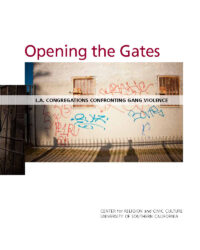“I was a good kid who did something very bad,” says Cornell Ward.
Though Ward was raised during hard times in South Central by a single mother whose restless ways meant Ward had to attend seven different elementary schools, the gifted athlete flourished at Los Angeles High School and was named College Football All-American at Compton Community College during his freshman year.
But when his GPA slipped and he had to return to his neighborhood, Ward let the set-back continue to determine his trajectory.
“I got into dealing drugs,” says Ward, who became a top lieutenant for Rick Ross, a drug lord who was known as the “King of Crack” during the worst days of the urban cocaine epidemic. “From the time I was 19 until I was 22,” Ward says, “I was in the streets selling this poison.”
Crack addiction claimed the lives of people all around Ward, including three members of his family. Just as he was beginning to heed the pleadings of friends and former coaches to get out of the drug scene, he was beaten and arrested by police officers who had a stake in his business.
“They were caught up in the mess just like me,” Ward says.
Ward was granted immunity from prosecution in exchange for his testimony against the crooked cops, and he spent the next couple of decades regaining the ground he had lost and building a career as an activist-athlete. He’s now the head coach of the football team at Compton College.
How has the Institute for Violence Prevention figured into his efforts to give back?
“I’ve always been involved in community work,” Ward says with an ironic smile. “Only now it’s about giving life, not taking it.”
As the executive director of the Unity One Foundation, Ward oversees character development and leadership training curricula as well as programs to reduce recidivism among former prison inmates who are reentering their communities. He has also developed a broad network of relationships to reduce inter-gang violence.
“There are 12 geographical war zones that we work in,” Ward says. “In those zones we have relationships with different gangs along with support from gang intervention groups like clergy, civic organizations and law enforcement. The point is to put the fires out before they spread.”
Ward, who has mentored hundreds of student athletes, sees his own story as the clearest evidence that even the most hardcore life in the drug-and-gang scene can be transformed.
“Drug dealers are great at math,” he says with the same sly smile. “And they have to have some pretty sharp people skills.”
Nick Street was a senior writer with the USC Center for Religion and Civic Culture.

